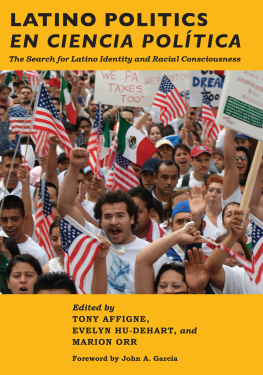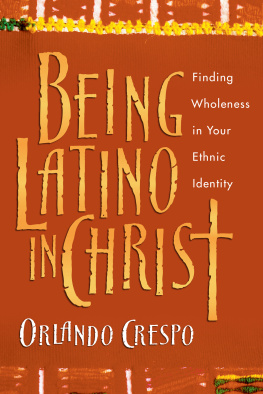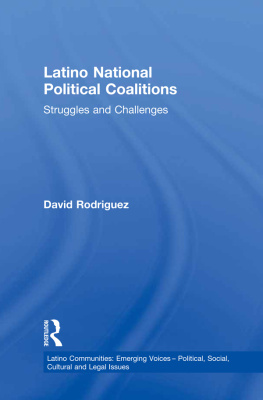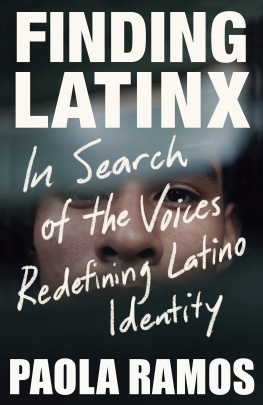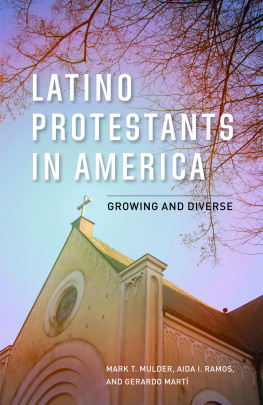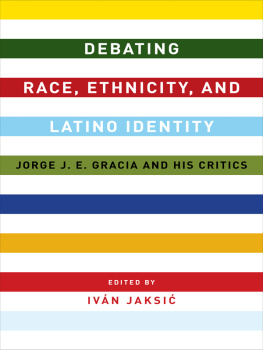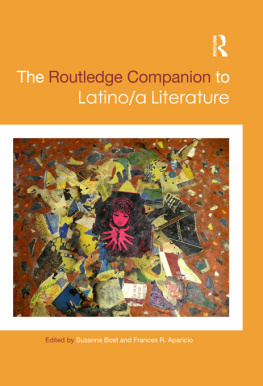Thank you for buying this ebook, published by NYU Press.
Sign up for our e-newsletters to receive information about forthcoming books, special discounts, and more!
Sign Up!
About NYU Press
A publisher of original scholarship since its founding in 1916, New York University Press Produces more than 100 new books each year, with a backlist of 3,000 titles in print. Working across the humanities and social sciences, NYU Press has award-winning lists in sociology, law, cultural and American studies, religion, American history, anthropology, politics, criminology, media and communication, literary studies, and psychology.
Latino Politics en Ciencia Poltica
Latino Politics en Ciencia Poltica
The Search for Latino Identity and Racial Consciousness
Edited by Tony Affigne, Evelyn Hu-DeHart, and Marion Orr
NEW YORK UNIVERSITY PRESS
New York and London
www.nyupress.org
2014 by New York University
All rights reserved
References to Internet websites (URLs) were accurate at the time of writing.
Neither the author nor New York University Press is responsible for URLs that may have expired or changed since the manuscript was prepared.
ISBN 978-0-8147-6379-7 (cl : alk paper)
ISBN 978-0-8147-6898-3 (pb : alk. paper)
For Library of Congress Cataloging-in-Publication data, please contact the Library of Congress.
New York University Press books are printed on acid-free paper, and their binding materials are chosen for strength and durability. We strive to use environmentally responsible suppliers and materials to the greatest extent possible in publishing our books.
Manufactured in the United States of America
c 10 9 8 7 6 5 4 3 2 1
p 10 9 8 7 6 5 4 3 2 1
Also available as an ebook
We dedicate this book to early pioneers of Latino political studies, whose vision and perseverance made our own work possible
With our thanks
Carlos H. Arce
Rodolfo O. de la Garza
Louis DeSipio
Angelo Falcn
F. Chris Garcia
John A. Garca
Ralph C. Guzmn
Carol Hardy-Fanta
Rodney E. Hero
James Jennings
Benjamin Mrquez
Carlos Muoz, Jr.
Harry P. Pachon
Christine Marie Sierra
Adaljiza Sosa-Riddell
Maurilio Vigil
Roberto E. Villarreal
Contents
John A. Garca
Tony Affigne, Evelyn Hu-DeHart, and Marion Orr
Tony Affigne
Jessica Lavariega Monforti
Sarah Allen Gershon and Adrian D. Pantoja
Jessica Lavariega Monforti and Melissa R. Michelson
Regina Branton, Ana Franco, and Robert Wrinkle
Heather Silber Mohamed
Marion Orr, Domingo Morel, and Katrina Gamble
Atiya Kai Stokes-Brown
Matt A. Barreto and Gabriel R. Sanchez
Manny Avalos and Tony Affigne
Tables
Figures
Chapter Appendices
Foreword
Latino People, Politics, Communities, and Knowledge
JOHN A. GARCA
How do you hold a moonbeam in your hand? Although I am one who finds himself using musical metaphors far too often for others tastes, the elusiveness and complexities involved in the examination of, and the directing of systematic queries and analyses about, political behavior in the Latino communities make it a daunting challenge, one that I have been pursuing for over forty years. Given my strong personal ties, I am privileged to have the opportunity to add a foreword to this collection of research pieces, based on the Latino National Survey and its New England spin-off. In this foreword, I will try to construct my comments and observations within the context of my personal and professional experiences, concentrating on the critical elements and dynamics integral to advancing our understanding of the Latino communities in the U.S. While building knowledge is central to more academically oriented endeavors, the knowledge generated is equally pertinent for its application in enhancing the well-being of Latinos.
The Social Sciences and Latinos
This volumes first chapter discusses the evolution of social science survey research, the inclusion of Latinos as respondents, and incorporating subject matter particular to Latino interests and concerns. While the contemporary social science community as well as broader media and advertising interests have directed more attention toward Latinos in recent years, Affignes account of Latinos and social science research clearly indicates a very recent pattern of inclusion. The major social science surveys over the past thirty years were projects initiated by Latino scholars in the political science or other social science disciplines. The reporting of their findings is well documented in this books first chapter, so I will not be commenting on that discussion.
An observation I would like to make is that the contemporary growth of surveys incorporating Latinos into the sampled respondents and/or as primary respondents continues to be influenced greatly by Latino social scientists. These recent surveys have some historical linkage with three major Latino political and social surveys (i.e., the National Chicano Survey, the Latino National Political SurveyLNPS, and the Latino National SurveyLNS), and it is clear that the absence of such collective efforts would have certainly delayed attention in this area. The rise of the Pew Hispanic Center (now known as the Hispanic Trends Project) had its origins with the partnership of the Kaiser Family Foundation, the Washington Post, and the Pew Foundation. At the same time, a small number of Latino social scientists met with Pews sponsoring journalists and funders to discuss sampling challenges and substantive concerns, which must be considered in the conduct of survey research within Latino communities.
While my experience suggests strongly that the increased number and improved methodological training of Latino social scientists has been instrumental in creating Latino-inclusive surveys and interpreting their findings, a perennial debate continues to be about the comparative nature of survey design (i.e., whether a survey including Latinos must have a comparative sample of non-Latinos, or whether it is justifiable to have a survey of only Latinos). The edict of compared to what resonates among some scientists: that the significance of Latinos in American public life has real meaning when they are compared to other social groupings. For example, if one is studying minority group politics, is it necessary to design a survey which includes majority group members and other minority groups in addition to Latinos? In the case of the LNPS, comparing Latinos with non-Latinos (in the same communities from which the Latinos were selected) made possible within-group comparisons among people of Mexican, Cuban, and Puerto Rican origin as well as comparisons with non-Latinos living in proximity. Implicitly, acknowledging common political contexts in which different groups operate, while making visible any group-specific effects of such environments, was part of the LNPS design.

